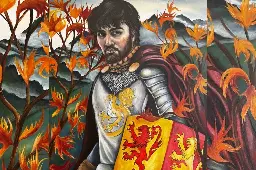Owain Glyndŵr Day marked across Wales today
Owain Glyndŵr Day marked across Wales today
Stephen Price People across Wales are marking Owain Glyndŵr Day today – a celebration of Owain Glyndŵr, the last native Prince of Wales and founder of the first Welsh parliament. On 16 September every year, thousands in Wales celebrate the life and legacy of the “rebel” Prince of Wales. Owain ap Gru...

People across Wales are marking Owain Glyndŵr Day today – a celebration of Owain Glyndŵr, the last native Prince of Wales and founder of the first Welsh parliament.
On 16 September every year, thousands in Wales celebrate the life and legacy of the “rebel” Prince of Wales.
Owain ap Gruffydd (c. 1359 – c. 1415), commonly known as Owain Glyndŵr was a Welsh leader who led a long-running war of independence to end English rule in Wales during the Late Middle Ages. He formed the first Welsh parliament, and he was the last native-born Welshman to hold the title Prince of Wales.
Owain Glyndŵr was a descendant of the Princes of Powys through his father Gruffudd Fychan II. Through his mother, Elen ferch Tomas ap Llywelyn, he was a descendant of the Princes of Deheubarth, also a descendant of Llywelyn the Great of the House of Aberffraw.
On 16 September 1400, Owain Glyndŵr proclaimed himself Prince of Wales and instigated a 15-year Welsh Revolt against the rule of King Henry IV of England.
His troops inflicted a series of defeats on the English forces and captured key castles across Wales, rapidly gaining control of most of the country. Glyndŵr received naval support from Scotland and Brittany and also received the support of King Charles VI of France.
In 1403 a Welsh army including a French contingent, commanded by Owain Glyndŵr, his senior general Rhys Gethin and Cadwgan, Lord of Glyn Rhondda, defeated a large English invasion force reputedly led by King Henry IV himself at the Battle of Stalling Down in Glamorgan.
By 1404 four English military expeditions had been repelled and Owain solidified his control of Wales. He was officially crowned Prince of Wales (Welsh: Tywysog Cymru) and held a parliament at Machynlleth where he outlined his national programme for an independent Wales, which included plans such as building two national universities, re-introducing the traditional Welsh laws of Hywel Dda, and establishing an independent Welsh church.